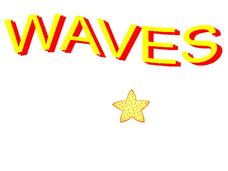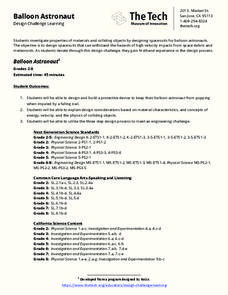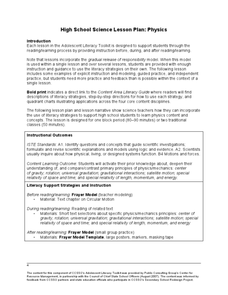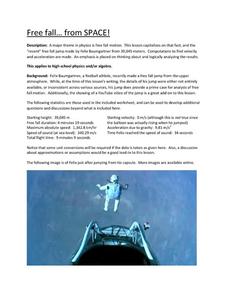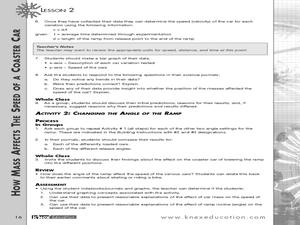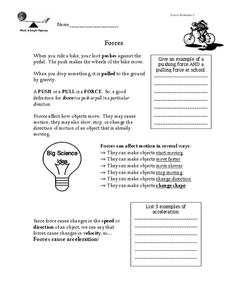It's About Time
Automatic Triggering Devices
How does the air bag trigger in an accident? The lesson explores how automatic triggering devices work in automobiles. Using examples such as a seat belt lock and air bag, scholars design their own device to better understand the...
Curated OER
Waves
An incredibly colorful PowerPoint presents all the facts and definitions about waves that you could need for beginning physical scientists. There are several useful links to online animations of wave action. This may have been produced...
Curated OER
Unit VIII: Worksheet 4 - Central Force
Send physics learners into orbit by assigning this seven-problem worksheet. They will calculate the mass of a satellite, construct a force diagram, determine the radius of the orbit, and more. Physics worksheets can become wearisome, but...
Curated OER
Lesson 3: Acceleration and Force
A nine-page physics resource supports your lesson on acceleration. A step-by-step lesson plan walks you through the materials you need, the background information, steps for leading experimentation, and the explanation of the results....
Tech Museum of Innovation
Balloon Astronaut
Design protection from high-speed particles. The STEM lesson plan highlights why astronauts need protection from space debris. Pupils use the design process to design, build, and test a spacesuit that will protect a balloon from a...
It's About Time
Cushioning Collisions (Computer Analysis)
Did you know the car bumper is specifically designed to save the car and not the passengers in case of an accident? Young scientists use a computer, a force probe, and a sonic ranger to experiment with external cushioning on cars.
Curated OER
Typical Numeric Questions for Physics I - Work and Energy
A total of 29 word problems furnish practice in solving for work, energy, and force. A few of the questions display diagrams to help learners visualize the systems, and all of them list five choices from which they select the correct...
Cornell University
Physics of Flight
Up, up, and away! Take your classes on a physics adventure. Learners explore the concepts important for flight. They experiment with the Bernoulli Principle while learning the forces that act on airplanes in flight.
Bethel School District
Observations and Inference
What's the difference between qualitative and quantitative observations? Learners make observations, inferences, and predictions about their environment with a set of questions and activities that are applicable to either language arts...
Curated OER
Circular Motion
Twelfth graders discuss centrifugal force, frictional force, and critical speed as it relates to the popular amusement park ride, the Gravitron.
University of Wyoming
Free Fall…From SPACE!/Nanotechnology in the Classroom
Provide the details about Felix Baumgartner's sky jump from the far reaches of our atmosphere, 39,045 meters up! Then get your physics free fallers to evaluate the factors that played a role in his acceleration, the time to reach maximum...
Curated OER
Creating Impact Craters
Sixth graders simulate the creation of impact craters on Mars.Through the creation of model surfaces, the effects of an impacting object's mass, velocity and size are determined, and the features of the resulting crater are identified.
Curated OER
Super Gelatin
Students investigate the refraction properties of gelatin to calculate its index of refraction. They discover that as the light travels through the gelatin, its speed and wavelength also change. Students find th indes of refraction of an...
Curated OER
Motion
In this motion worksheet, students will read 8 statements about displacement and velocity and determine if the statement is true or false. Then students will fill in the blank for 8 statements on motion. Finally, students will compare...
Curated OER
Particle Models in Two Dimensions
In this motion worksheet, learners draw and label the trajectory of objects including the x-component and y-component of the velocity. Students calculate acceleration and speed. This worksheet has 7 problems to solve.
Curated OER
Questions Module 8
In this science worksheet, students find the answers to significant questions about speed and velocity while looking for meaning with the help of others in class or online from a homework buddy.
Curated OER
Dude, Who Hit My Car?
Students discuss how investigators solve a hit and run accident. For this physical science lesson, students recreate an accident scene using CEENBot. They collect data from the experiment and formulate conclusion.
Curated OER
Don’t Sit Under the Apple Tree…You Might Become Famous
Students explore Newton's laws using CEENBoTs. In this physics lesson, students collect data and create tables and graphs. They calculate speed, acceleration and forces using mathematical formulas.
Curated OER
How Mass Affects the Speed of a Coaster Car
Students determine what factors affect the speed of the car. In this physics lesson, students calculate speed, velocity and acceleration from experimental data. They construct and interpret motion graphs.
Curated OER
Speed Trap
Students conceptually explore motion graphing by producing motion at different speeds and directions. They experience the lab and then graph the motion of the truck at various speeds and directions. The procedures of velocity are...
Curated OER
Forces
In this forces worksheet, students read about force and acceleration. They complete a Venn Diagram to compare and contrast balanced and unbalanced forces, they answer questions about a diagram of a tug-a-war and the forces acting on each...
Curated OER
The Effects of Storms
An excellent way to review a chapter or unit on storms, this worksheet features vocabulary review (gust, evacuation, storm surge, salinity), concept review (effects and details about hurricanes), skills/process review (normal high tide...
Curated OER
Projectile Intro Problems
For this projectile worksheet, students determine an object's initial vertical and horizontal velocity and its overall speed at different points in its travel. This worksheet has 5 problems to solve.
Curated OER
Circular Motion: Target Practice
Students demonstrate direction of velocity of an object in circular motion. They discuss the mathematical formula, and demonstrate the formula using a string, rubber stopper and a target.



